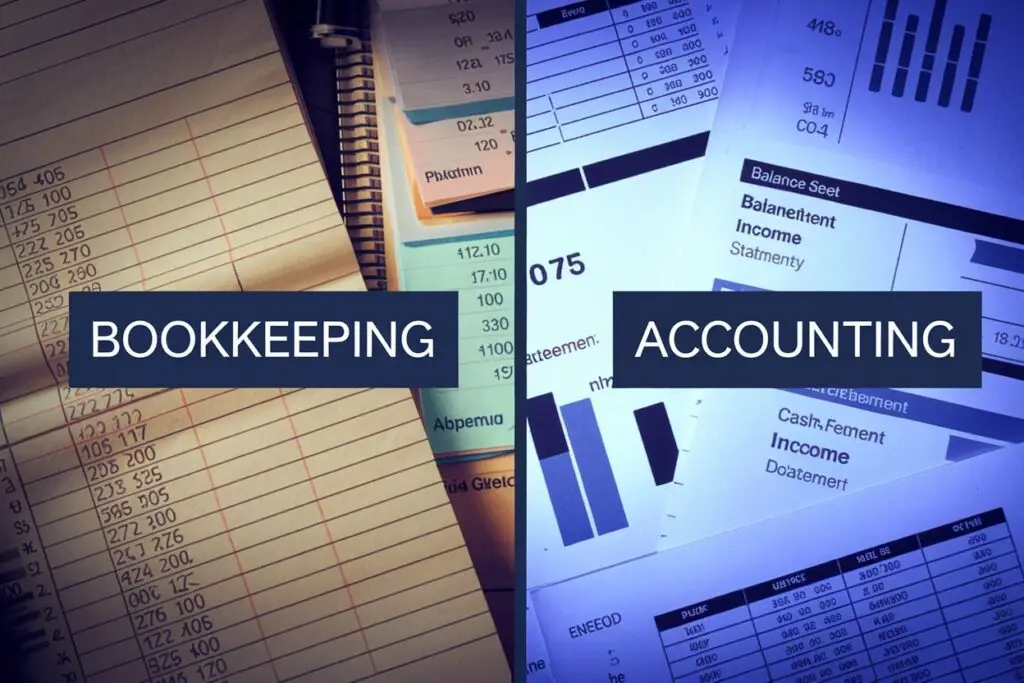The Difference Between Bookkeeping and Accounting
Bookkeeping is the science and art of correctly recording in books of accounts all those business transactions that result in the transfer of money or money’s worth. Bookkeeping is recording a business’s financial transactions methodically so that information on any point about them may be quick.
What is Bookkeeping?
Bookkeeping is the systematic and organized process of recording financial transactions in a consistent and coherent manner over time. This essential aspect of accounting involves various transactions. Businesses make purchases, sell goods or services, receive payments from clients or customers, and pay vendors or service providers.
An essential component of bookkeeping is the meticulous tracking of each transaction to ensure that all financial activities are documented accurately. This involves not only recording the amounts involved but also categorizing each transaction appropriately, such as distinguishing between operating expenses, capital expenditures, and income received.
The primary focus of bookkeeping is to maintain up-to-date and precise records that reflect the financial health of an organization. This accuracy in record-keeping is crucial, as it ensures that all financial data is readily accessible for various purposes, including financial reporting, budgeting, and tax preparation.
Key Responsibilities of Bookkeeping:
- Recording Transactions: Bookkeepers enter every financial transaction into a ledger.
- Managing Receipts and Invoices: They keep track of bills and receipts for accurate record-keeping.
- Reconciling Bank Statements: Regular reconciliation of bank statements helps maintain consistency between accounts.
- Maintaining Financial Records: Organizing and preserving financial documents for easy access and accuracy.
Bookkeeping lays the groundwork for financial operations, providing essential data for accountants and financial analysts.
What is Accounting?
Accounting extends beyond the basic functions of bookkeeping by engaging in a thorough analysis, interpretation, and summarization of the financial data that has been collected. While bookkeeping involves the systematic recording of financial transactions, accounting takes this information to the next level. It delves into the financial figures to extract meaningful insights regarding a company’s overall financial well-being and operational performance.
One of the key objectives of accounting is to evaluate a company’s financial health. This involves assessing various financial metrics, such as profitability, liquidity, and solvency, to provide stakeholders with a comprehensive view of how well the business is performing. By examining trends and financial ratios, accounting helps identify potential areas of concern and opportunities for growth, enabling management to make proactive and strategic decisions.
In addition to providing insights, another critical aspect of accounting is ensuring compliance with relevant tax laws and financial regulations. Accountants play a vital role in preparing and filing tax returns while adhering to legal requirements. This not only helps prevent potential penalties and legal issues but also ensures that the company remains in good standing with tax authorities.
Key Responsibilities of Accounting:
- Financial Reporting: Accountants generate financial statements, including income statements and balance sheets.
- Tax Preparation: They ensure that financial records comply with tax regulations and prepare tax returns.
- Budgeting and Forecasting: Accountants analyze past financial data to create budgets and forecasts for future financial activities.
- Advisory Services: Offering strategic advice based on financial data analysis to help businesses grow.
Comparison Table: Bookkeeping vs. Accounting
| Feature | Bookkeeping | Accounting |
|---|---|---|
| Focus | Recording transactions | Analyzing and summarizing data |
| Primary Role | Data entry and maintenance | Financial analysis and reporting |
| Tools Used | Ledgers and spreadsheets | Accounting software and systems |
| Timeframe | Ongoing process | Periodic reporting (monthly, yearly) |
| Required Skills | Attention to detail | Analytical thinking and problem-solving |
| Certification | Less formal (may not need certification) | Professional qualifications (CPA, ACA) required |
“Bookkeeping is the backbone of any business. It streamlines financial operations and sets the foundation for informed decision-making.” — Anonymous
The Interrelationship Between Bookkeeping and Accounting
While bookkeeping and accounting differ in their functions, they are interdependent. Effective bookkeeping supplies the necessary data for accurate accounting. Without meticulous records, accountants would struggle to produce reliable financial statements or offer insightful analysis.
The Importance of Each Function
- Accurate Financial Data: Bookkeeping ensures that every transaction is recorded properly, which lays the groundwork for reliable financial reporting by accountants.
- Compliance and Regulation: Accounting ensures that all financial practices adhere to laws and regulations, thereby avoiding legal issues.
- Strategic Decision-Making: Accounting utilizes organized data from bookkeeping to support business strategies and decisions, enhancing overall performance.
FAQs
What is the main objective of bookkeeping?
The primary objective of bookkeeping is to maintain accurate financial records. This allows businesses to track their income, expenses, and overall financial health effectively.
Can a business operate without bookkeeping?
While it’s theoretically possible to run a business without bookkeeping, it would result in a chaotic approach to finances and could lead to severe errors and legal issues.
Are bookkeeping and accounting software the same?
While both types of software serve to manage finances, bookkeeping software focuses on transaction management and recording, while accounting software offers analytical tools and reporting features.
How often should bookkeeping be done?
Bookkeeping should ideally be done daily or weekly to ensure accuracy and to avoid an overwhelming backlog at the end of the month.
Do you need a degree to become a bookkeeper?
A degree is not strictly required to become a bookkeeper. However, familiarity with financial matters and relevant certification can enhance job prospects.
Conclusion
Understanding the difference between bookkeeping and accounting is crucial for any individual or business managing finances. Bookkeeping serves as the backbone that supports the accounting process, and together, they create a robust financial environment. By recognizing the unique roles of each, business owners can ensure their financial operations run smoothly, paving the way for greater success in the future.



